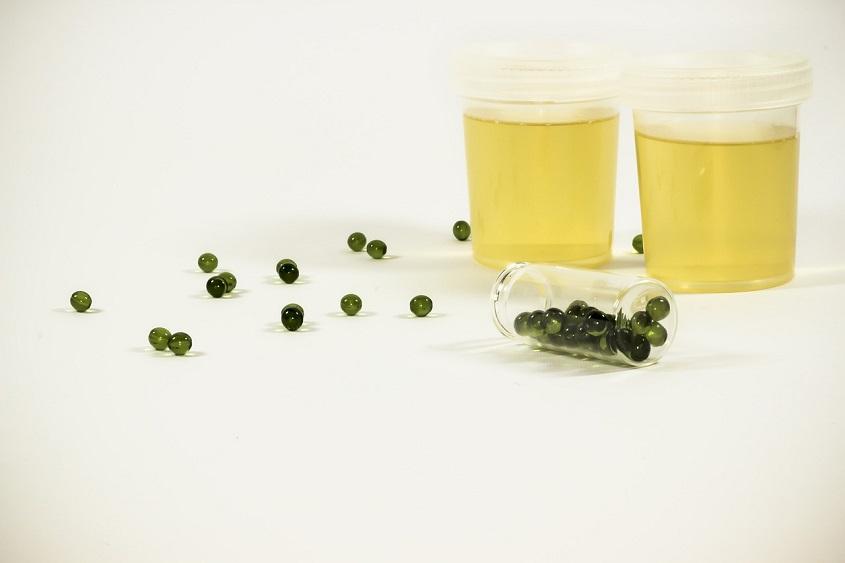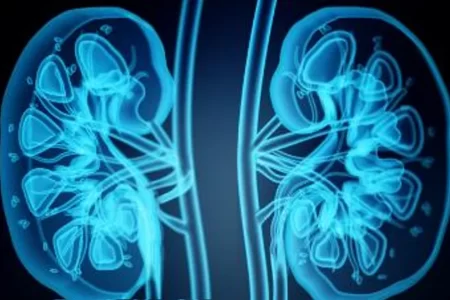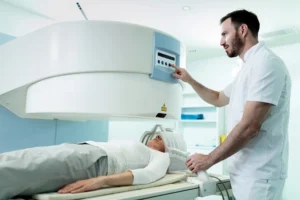Identifying Kidney Stones in Your Urine: What to Look For?
- Updated on: Jan 24, 2024
- 4 min Read
- Published on Mar 6, 2023

Kidney stones are hard mineral deposits that form in the kidneys and can cause severe pain and discomfort when passed through the urinary tract. It’s important to identify kidney stones in urine because the presence and appearance of these stones can provide valuable information about their size, composition, and potential to cause complications.
Some things to look for when identifying kidney stones in urine include:
- Presence of small, gritty particles that may indicate the beginning of stone formation
- Clumps of crystals that are visible to the naked eye, indicating larger stones
- Larger stones that may be smooth, jagged, or have a spiky appearance, depending on their composition
By identifying kidney stones in urine, healthcare professionals can provide an accurate diagnosis and develop a targeted treatment plan to help patients manage their symptoms and prevent future stone formation.
Symptoms of kidney stones
Kidney stones are a common condition that can cause a range of uncomfortable symptoms. Pain during urination, blood in urine, frequent urge to urinate, nausea, vomiting, pain in the back or side are all potential symptoms of kidney stones. In addition to these, patients may also experience chills, fever, and cloudy urine. If you notice any of these symptoms, it’s important to seek medical attention promptly. Identifying kidney stones in urine is an important part of the diagnostic process, as it can help doctors determine the best course of treatment. But what do kidney stones look like in the toilet? Let’s explore this in more detail.
- Pain during urination
- Blood in urine
- Frequent urge to urinate
- Nausea and vomiting
- Pain in the back or side
- Chills, fever, cloudy urine.
How kidney stones are diagnosed?
When it comes to diagnosing kidney stones, several methods can be used to determine the presence, size, and location of the stone. These methods include:
-
Urinalysis
A urine sample can be analyzed to detect the presence of blood, minerals, or other substances that may indicate the presence of kidney stones.
-
Imaging tests
X-rays, CT scans, and ultrasounds can be used to produce images of the kidneys and urinary tract, allowing healthcare professionals to locate and identify kidney stones.
-
Blood tests
Blood tests can be used to evaluate kidney function and detect any signs of infection or inflammation.
-
Other diagnostic tests
In some cases, additional tests may be necessary to determine the cause of the kidney stones, such as a 24-hour urine collection to evaluate the levels of certain minerals in the urine.
Identifying kidney stones in the urine
When trying to identify kidney stones in the urine, there are several factors to consider. Here are some things to look for:
- Appearance: Kidney stones may be visible in the urine, appearing as small, solid, pebble-like objects.
- Color and texture: Urine with kidney stones may appear cloudy, brown, red, or pink, and may have a strong odor. The texture may be grainy or sandy due to the presence of particles from the stone.
- Size and shape: The size and shape of the stone can also be a factor in identifying it. Some stones may be too small to see with the naked eye, while others may be large enough to cause blockages in the urinary tract.
- What to look for: When examining urine for kidney stones, it’s important to look for any unusual particles or sediment that may indicate the presence of a stone. It’s also important to note any accompanying symptoms, such as pain or discomfort during urination.
What does it mean to find kidney stones in urine?
Potential causes of kidney stones include dehydration, a diet high in salt and sugar, obesity, and a family history of the condition. To prevent kidney stones, it’s important to stay well hydrated, limit your intake of high-sugar and high-salt foods, and maintain a healthy weight.
Treatment options for kidney stones include pain management, medication to help break up the stones, and in some cases, surgery. It’s important to work closely with your healthcare provider to determine the best course of action for your specific case.
What do kidney stones look like in the toilet?
Kidney stones, when they are passed into the toilet, can have varied appearances, depending heavily on their size, composition, and the duration they have resided in the urinary tract. Commonly, kidney stones are small, often the size of a grain of sand, and might not be easily noticeable. They can be as small as a speck of dust, or they can grow to several millimeters in diameter. When a larger stone is passed, it is more noticeable and can sometimes be alarming due to its size and shape.
The color of kidney stones can vary significantly. They often appear yellow or brown, but can also be tan, gold, or even black. The texture varies as well: some stones are smooth and round, resembling small pebbles, while others are jagged or irregular, with sharp, uneven surfaces. These variations in color and texture are influenced by the stone’s composition. For instance, calcium oxalate stones, the most common type, are usually darker and rougher, while uric acid stones tend to be smoother and lighter in color.
It’s important to note that not all particles or sediments found in the toilet are kidney stones. Sometimes, what might appear to be a stone could be a concretion of other materials or even undissolved medications. If you suspect you have passed a kidney stone, it’s advisable to retrieve it, if possible, for analysis by a healthcare provider. This can provide valuable information about the stone’s composition, which is crucial for preventing future stones and for determining if any underlying health issues need to be addressed.
Finding kidney stones in your urine can be a sign of an underlying condition that needs to be addressed. By taking steps to prevent kidney stones and working closely with your healthcare provider, you can manage this condition and maintain your overall health. Remember, always consult with your healthcare provider before making any changes to your diet or treatment plan.
FAQs
Can I identify kidney stones in my urine without medical tests?
While some signs like cloudy or foul-smelling urine may indicate kidney stones, a proper diagnosis requires medical evaluation, including imaging and urine tests.
What color changes in urine may indicate the presence of kidney stones?
Dark or discolored urine, especially pink or red, may suggest the presence of blood, a common indicator of kidney stones. Seek medical attention promptly if you notice such changes.
Are all kidney stones visible in urine, or can some be missed?
Not all stones are visible in urine. Some may be too small to be detected visually, necessitating additional diagnostic methods like CT scans or ultrasound for accurate identification.
Can diet affect the appearance of kidney stones in urine?
Yes, dietary factors influence urine composition, potentially impacting stone visibility. Increased fluid intake and dietary modifications can help prevent and manage kidney stones.
What does it mean if I consistently see sediment in my urine?
Persistent sediment may indicate the presence of crystals or tiny stones. Consult your healthcare provider for a thorough evaluation, as it could be an early sign of kidney stone formation.












